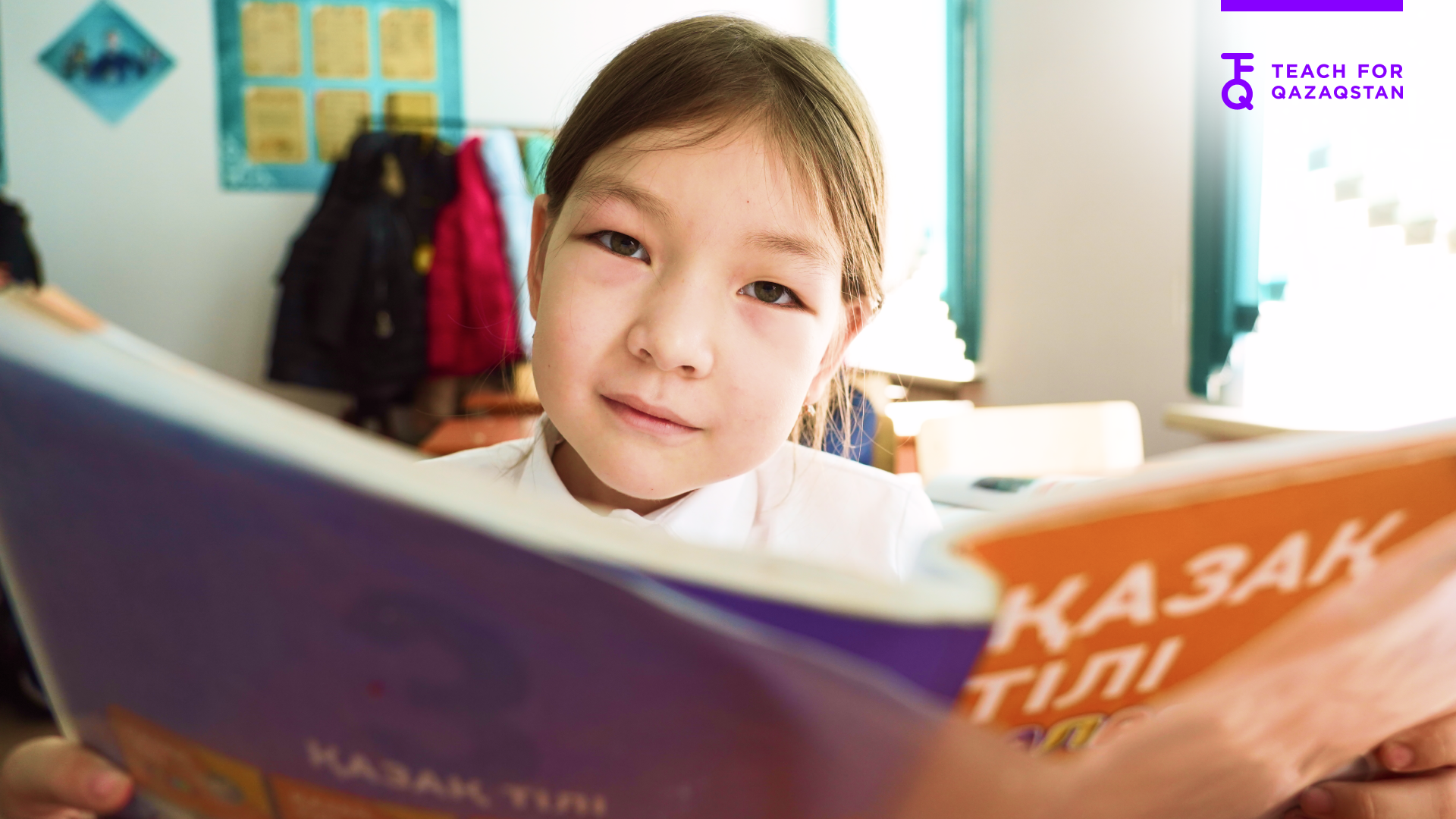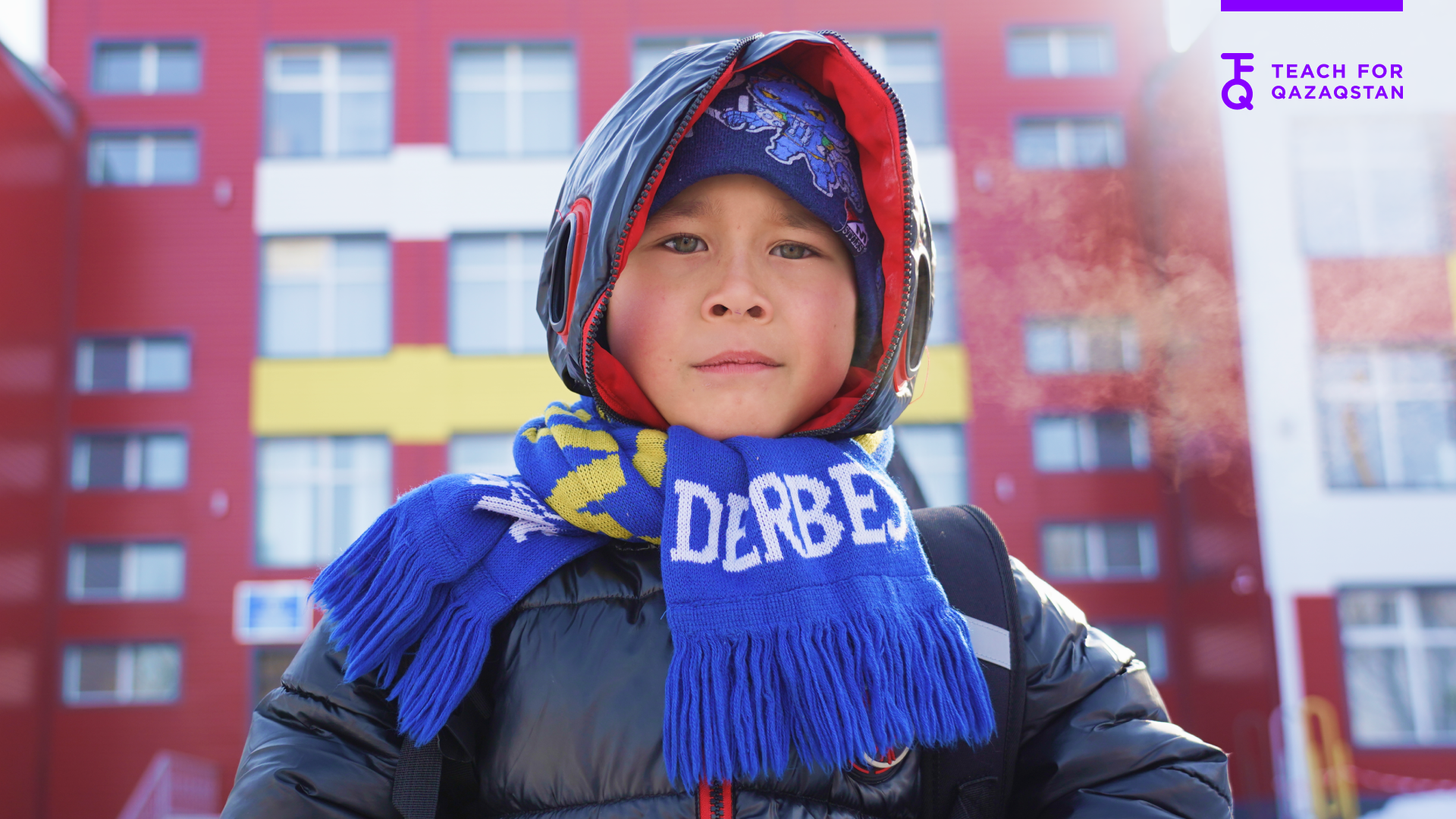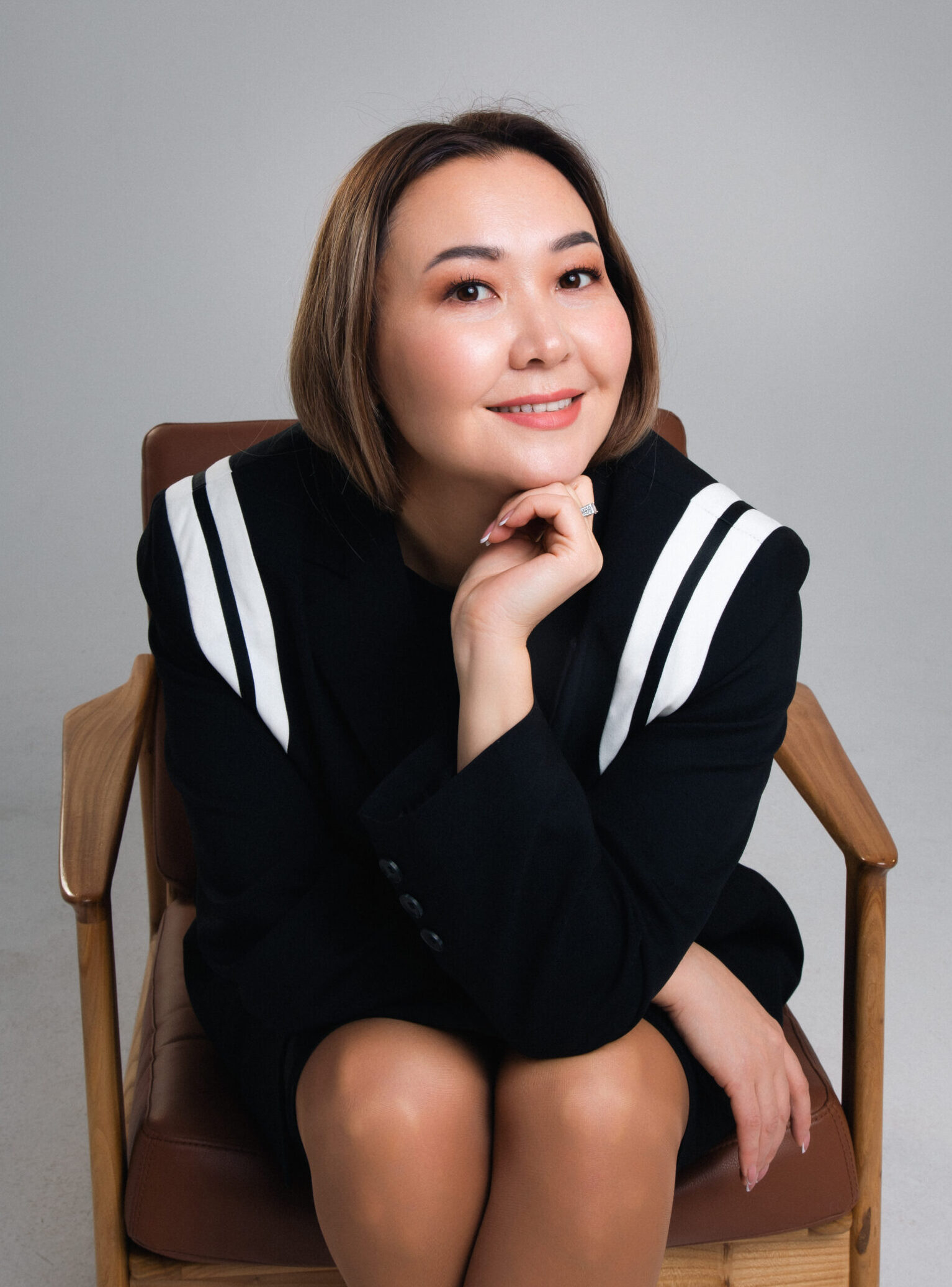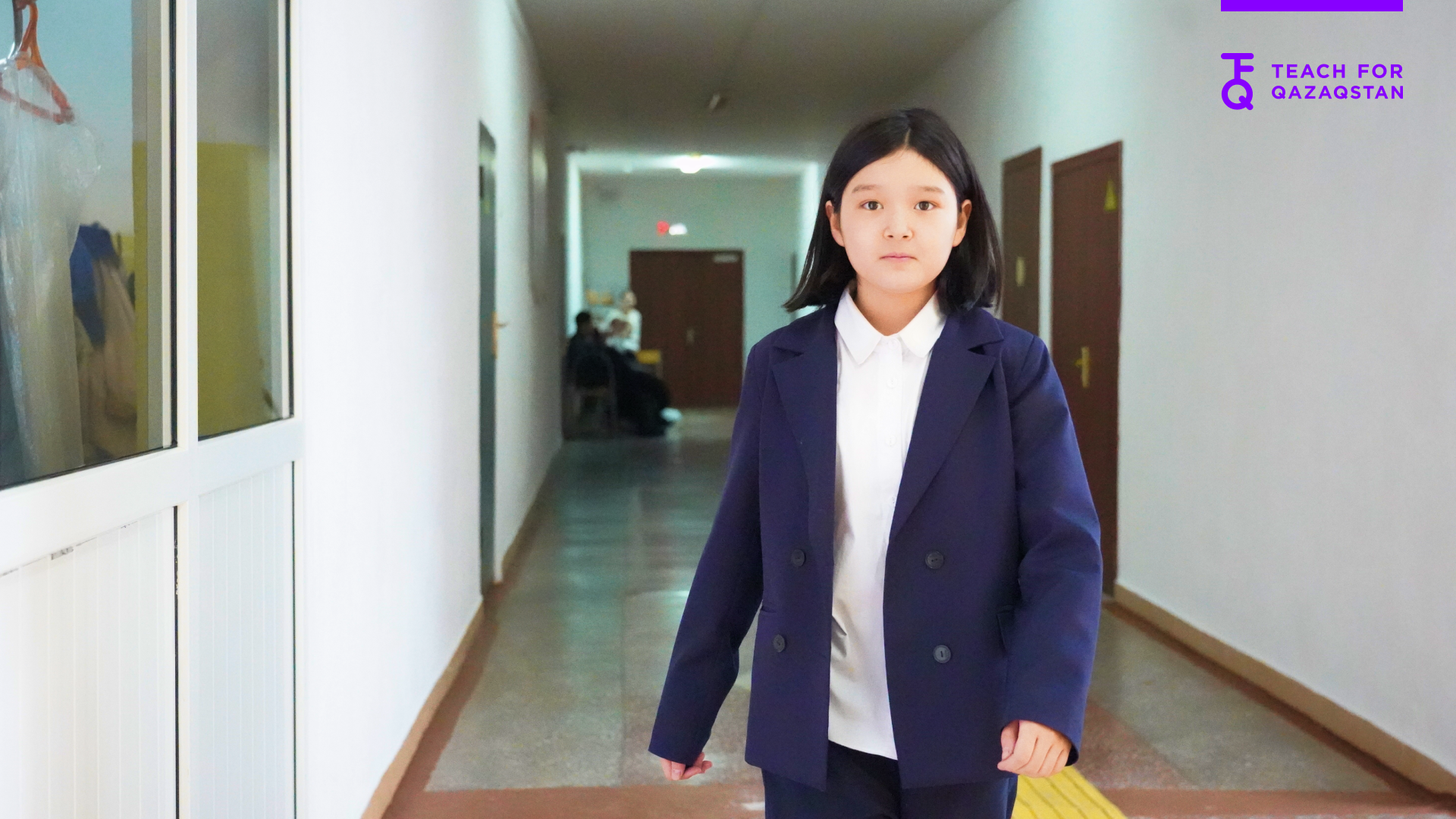ASTANA – Some of the nation’s talented specialists and leaders from various fields are bringing their devotion to teaching in rural areas on a two-year placement through Teach for Qazaqstan (TFQ) program, said the program’s founder and Chief Executive Officer Gulnara Salmen.

Addressing educational disadvantages and reducing the gap between rural and urban education lies at the heart of this program. Photo credit: TFQ press service.
As part of the global Teach for All educational movement that operates in 60 countries, TFQ selects specialists from various disciplines and assigns them to work in rural schools in remote regions with teacher shortages.
“Teach for Qazaqstan is a community of leaders we want to build in the country through a rigorous selection process. The program is unique in attracting specialists from various fields and organizing pedagogical retraining,” Salmen said in an interview for this story.
Similar to many countries worldwide, Kazakhstan faces the challenge of getting qualified teachers into schools that need them most.

To produce notable outcomes, young teachers must go beyond the classroom by forging better connections with children and global trends. Photo credit: TFQ press service.
Addressing educational disadvantages and reducing the gap between rural and urban education lies at the heart of this program, underpinned by the belief that young teachers are the key to the nation’s bright future.
Over the past ten years, there have been several attempts to launch the program.
In 2012, Sayasat Nurbek, the current Minister of Science and Higher Education, and at the time the president of the Bolashak scholarship program center, was negotiating with Teach for America to recruit Bolashak graduates to schools, but the initiative did not receive the necessary backing and did not to launch.

Teach for Qazaqstan CEO Gulnara Salmen.
In 2018, a team led by community activist Gulnaz Kordanova succeeded in partnering with Teach for All. However, they did not proceed with the project due to the leadership’s change of plans. A new team was put in charge.
“As a CEO, I started the project in September 2022, and with the managing partner of McKinsey & Company in Central Asia, Dulatbek Ikbaev, we reassessed the project and created a new public foundation, Teach for Qazaqstan. From the very first days, we received great support and began to prepare for the project launch in 2023,” said Salmen.
The CEO learned first-hand about the hardships one can face in education. Born in a small town, she knows the educational outcomes for children of rural areas lag behind those of the city.
“This is part of my history too. I was born in an auyl [a village in Kazakh], I lived in an auyl. My parents, knowing the value of education back in 1996, moved from the North Kazakhstan Region to Aqmola [now Astana]. As a girl who transferred from a rural to an urban school, I already saw a huge difference in education and the system’s failure,” Salmen said.
Her enthusiasm stems from a genuine passion for education and her parents’ devotion to giving children access to brilliant educators.
“In addition to educating their own children, my parents helped many of their student relatives who attended local universities and colleges. My parents became their parents, changing their norms of life, which is probably a very familiar experience. Some have gone into business and became successful. All have wonderful families. I think this is why we need to help people get a decent education. Our project makes that possible,” she said.
According to Salmen, there are various degrees of the educational divide between urban and rural communities.
“I would say that the quality of education in the regions varies. This is often influenced by many socio-economic factors, such as underdeveloped infrastructure, underfunded and understaffed schools, the remoteness of the region in which children study, the social status of parents, the standard of living, the number of people in the region, and so on,” she noted.

With the general education system emphasizing “quantitative indicators,” such as the number of schools, teachers, and funds, TFQ seeks “qualitative change.” Photo credit: TFQ press service.
“Our goal is not to eliminate the lack of economic resources but to help with the human resources,” stressed Salmen.
With the general education system emphasizing “quantitative indicators,” such as the number of schools, teachers, and funds, TFQ seeks “qualitative change.”
“The contribution of the people we select for the program is to tell and show children life beyond the vision they are used to. We stand for unlocking the potential of every child and for providing new opportunities by engaging teachers who will be on the ground sharing their life experiences, worldviews, and values,” said Salmen.
The program also encompasses social context and social psychology.
“When we discuss our distinguishing characteristics, we point out we teach people in a socially oriented context. We explain that each school is unique: it has unique project implementation methods, teaching methods, and interaction methods with parents and children. Our educational program includes social context and social psychology, as well as several leadership-oriented teaching disciplines. As a result, our teachers do more than just impart knowledge to students; they also become children’s role models, their friends, inspirers, and supporters,” she said.
TFQ offers several incentives to encourage teachers into these remote schools, including three and half months of special pedagogy training, two years of methodological, coaching, and mentoring support, and a monthly stipend of 300,000 tenge (US$678) for the contract term in addition to the salary.
Other potentially persuasive benefits include getting assistance with the execution of projects and master classes, the ability to draw funding for some events, and becoming part of the global Teach for All educational networking.
After completing the program, the participants may choose to stay in the education system or enter any line of business. Regardless, they will remain part of the TFQ community and the global network.
“It seems to me the image of an applicant is about a person who wants to contribute to the development of the country,” said Salmen describing an ideal candidate for TFQ.
“This is a person with a growth mindset and ambition, brave, ready to move and change the way of life to which he is accustomed. A person who really wants, can and is willing to give children all the knowledge he has accumulated. Of course, we are talking about people with leadership qualities, proactive attitudes, literate and value-oriented. Our ideal candidate is a person who is focused on changing not only oneself but also the environment, someone who is ripe for accomplishments. We look for tenacity, compassion, patience, openness to new knowledge, and the ability to share,” she said.
To produce notable outcomes, young teachers must go beyond the classroom by forging better connections with children and global trends.
“If we are talking about an ideal teacher, I think it would be someone who can reflect. Someone who is always asking the question, did I succeed, how well did I succeed, what could or should I change, or how can I do it differently? The world is changing so fast. Children growing up now have different forms of perception of information. (…) We, as adults with our own experiences, may occasionally fail to consider children’s desires, needs, and viewpoints, so reflective teachers are essential in the current educational system to understand whether we are giving the right knowledge and skills,” she explained.
Applications for the teacher role continue until March 3 on this website.

